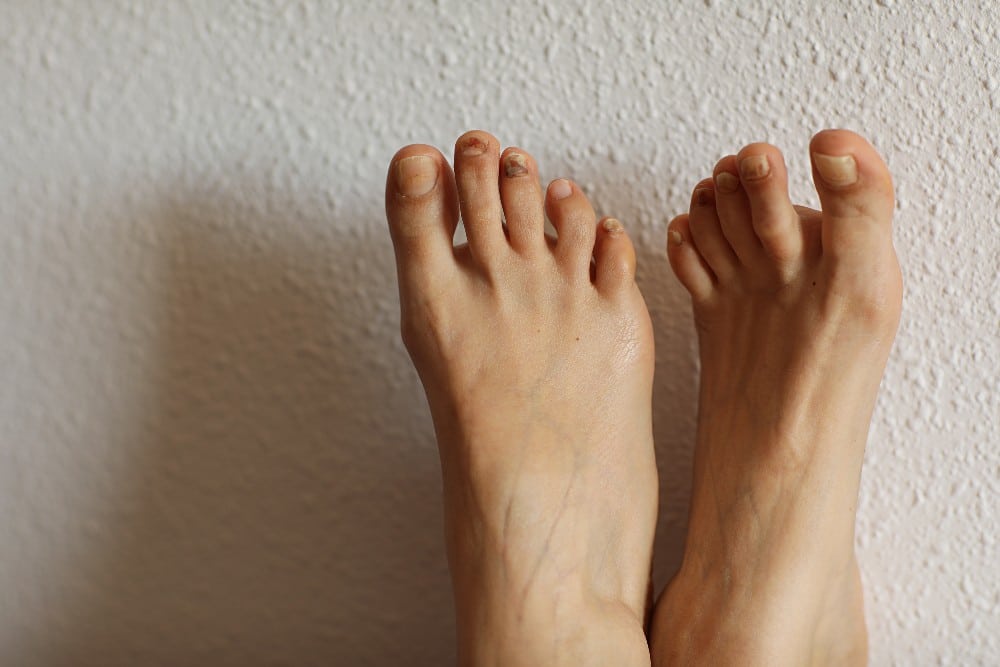Black Toenails
While it might sound like a goth fashion statement, black toenails are no joke. They can be a sign of something serious and require prompt attention. Do not worry, though – our experts at Premier Podiatry & Orthopedics are here to educate and inform you about black toenails and get you the treatment you need.
So, what are black toenails? Simply put, they are toenails that turn black or dark in color. But there is nothing simple about the possible causes behind them.
So, do you need to have black toenails checked by a doctor? Absolutely! While it depends on the cause, any black toenail that persists should be checked out by our experts. This is especially true if you have diabetes, as it can increase your risk for complications.
Take a look with us at everything you need to know about black toenails so that you can take care of yours and prevent it from returning in the future.
What are Black Toenails?
A black toenail is a condition where your toenail turns black or dark in color. It is not just a cosmetic issue, as it can be a sign of an underlying medical condition that needs treatment. The good news is that our team of experts can diagnose and treat your black toenails, whatever the cause.
Fungal Infections: One of the most common causes of black toenails is a fungal infection. This is often seen in toenails that have been damaged or injured. Fungal toenails can be treated with anti-fungal creams or even oral medications.
Melanoma: Another possible cause of black toenails is melanoma. This is a serious form of skin cancer that can spread quickly. If you see black spots spreading through your toenail, it is time to schedule an appointment with our doctors.
Trauma: Black toenails can also be caused by trauma. This can include stubbing your toe, dropping something heavy on your toe, or even wearing shoes that are too tight. If the black toenail is caused by trauma, it will fade in time. However, we can drain the blood from beneath the nail if needed.
Causes for Bleeding Underneath Nails
In rare cases, black toenails can be a sign of other underlying medical conditions. Our experts can help diagnose and treat these conditions.
Underlying Medical Conditions
If you have an underlying medical condition such as lupus or kidney disease, it can cause black toenails as well. it is important to see our experts to determine the cause of your black toenails and develop a treatment plan.
Other underlying medical conditions that can cause black toenails include:
- Raynaud’s disease
- Sickle cell anemia
- Psoriasis
- Rheumatoid arthritis
- Systemic lupus erythematosus
- Vasculitis
- Diabetes
- Peripheral arterial disease (PAD)
- Kidney disease
If you have any of these medical conditions and notice black toenails, it is essential to schedule an appointment with our doctors for proper diagnosis and treatment.
Do You Need to Have Them Checked by a Doctor?
Yes, it is important to have black toenails checked by a doctor, especially if they persist or are accompanied by pain, swelling, or drainage. Depending on the cause, black toenails can be a sign of an underlying medical condition that requires prompt attention. If you have diabetes, it is even more important to see our doctors, as diabetes can increase your risk for complications.
Any other underlying medical condition that affects your circulation, such as peripheral arterial disease (PAD). These conditions can increase the risk of complications from black toenails, so it is important to seek medical attention promptly. In any case, if you notice persistent black toenails, it is always a good idea to have them checked by our experts at Premier Podiatry & Orthopedics.
Can Black Toenails Cause Complications?
Yes, black toenails can cause complications depending on the cause.
If the black toenail is caused by toenail fungus, complications can arise and lead to more severe infections. The infection can spread to other toenails or even to other parts of the body. it is important to seek treatment from our experts to prevent the infection from getting worse.
If the black toenail is caused by melanoma, complications can be severe. Melanoma is a serious form of skin cancer that can spread quickly. If you see black spots spreading through your toenail, it is important to see our doctors right away for prompt diagnosis and treatment. Delay in treatment can result in serious complications or even death.
Treating Black Toenails
The treatment for black toenails depends on the cause. Here are some common treatments:
Fungal toenails: For fungal toenails, our doctors may prescribe anti-fungal creams or even oral medication to eliminate the infection. it is important to follow the treatment plan to prevent the infection from recurring.
Trauma: If the black toenail is caused by trauma, it will fade in time as the nail grows out. However, if the blood under the nail is causing significant pain or pressure, our experts can drain the blood from beneath the nail.
In addition to treating the underlying cause of black toenails, it is important to take steps to prevent them from recurring. This includes wearing comfortable, properly fitting shoes, trimming your toenails properly, and practicing good foot hygiene.
Prevent Black Nails from Trauma
Preventing black toenails caused by trauma is all about taking the right precautions. Here are some tips for preventing trauma-related black toenails:
- Wear comfortable, properly fitting shoes with good support to reduce the risk of stubbing your toe.
- Avoid wearing shoes that are too tight or high heels that can put excessive pressure on your toes.
- Trim your toenails straight across and not too short to prevent ingrown toenails, which can be painful and lead to black toenails.
Following these tips can help prevent black toenails caused by trauma. If you notice any signs of persistent black toenails, do not hesitate to contact our team at Premier Podiatry & Orthopedics for expert diagnosis and treatment. Schedule an appointment today to take the first step in keeping your feet healthy and pain-free.
The Bottom Line
In conclusion, black toenails are not just a cosmetic issue and can be a sign of an underlying medical condition that requires treatment. Whether caused by toenail fungus, melanoma, or trauma, it is important to have black toenails checked by our experts at Premier Podiatry & Orthopedics.
Depending on the cause, treatment options can include anti-fungal creams, oral medication, draining the blood from beneath the nail, or other medical interventions. By following our tips for preventing black toenails caused by trauma, you can reduce your risk of this painful and potentially serious condition.
Do not wait – contact us today to schedule an appointment and take the first step in keeping your feet healthy and pain-free.
Looking to schedule an appointment with a physician?
Carmichael Office
6620 Coyle Avenue,
Suite 202
Carmichael, CA 95608
Roseville Office
576 N Sunrise Avenue,
Suite 230
Roseville, CA 95661
Folsom Office
1580 Creekside Drive,
Suite 100 & 110
Folsom, CA 95630
Social
© Premier Podiatry & Orthopedics. All Rights Reserved. | Privacy Policy

